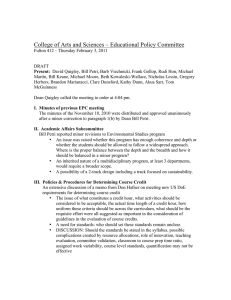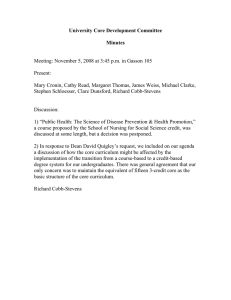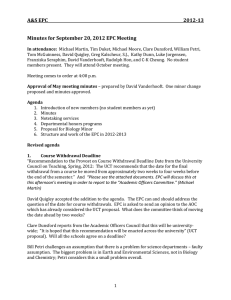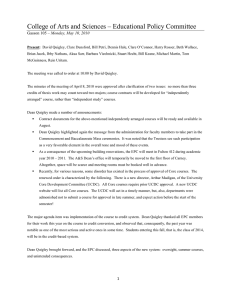A&S EPC November 29 , 2012
advertisement
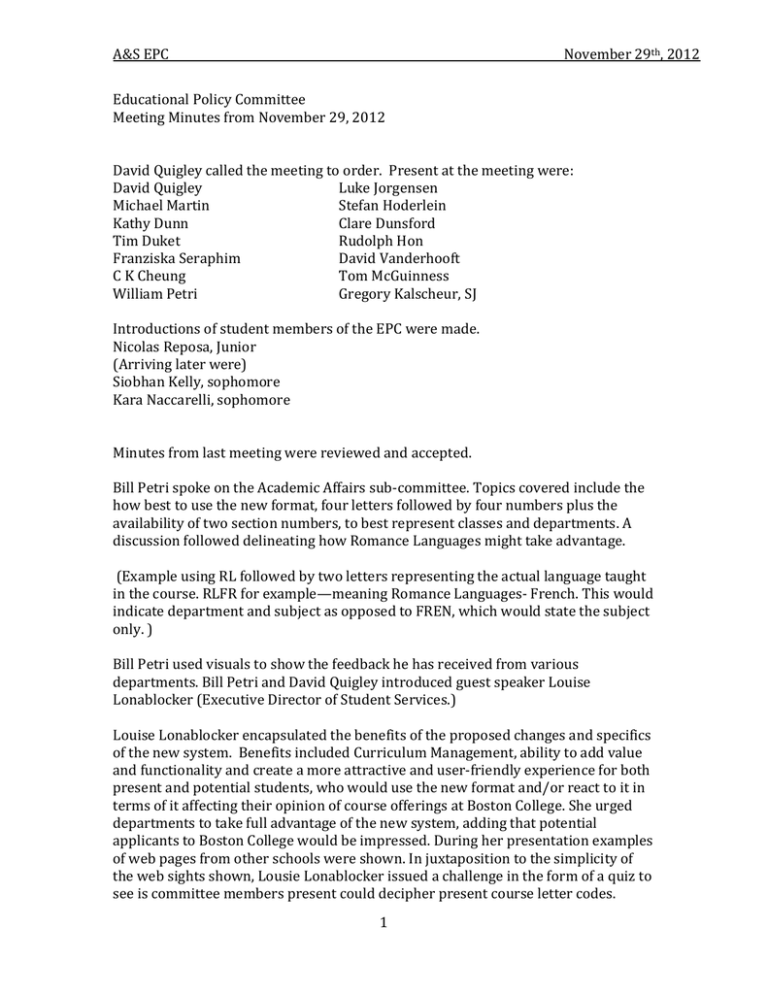
A&S EPC November 29th, 2012 Educational Policy Committee Meeting Minutes from November 29, 2012 David Quigley called the meeting to order. Present at the meeting were: David Quigley Luke Jorgensen Michael Martin Stefan Hoderlein Kathy Dunn Clare Dunsford Tim Duket Rudolph Hon Franziska Seraphim David Vanderhooft C K Cheung Tom McGuinness William Petri Gregory Kalscheur, SJ Introductions of student members of the EPC were made. Nicolas Reposa, Junior (Arriving later were) Siobhan Kelly, sophomore Kara Naccarelli, sophomore Minutes from last meeting were reviewed and accepted. Bill Petri spoke on the Academic Affairs sub-committee. Topics covered include the how best to use the new format, four letters followed by four numbers plus the availability of two section numbers, to best represent classes and departments. A discussion followed delineating how Romance Languages might take advantage. (Example using RL followed by two letters representing the actual language taught in the course. RLFR for example—meaning Romance Languages- French. This would indicate department and subject as opposed to FREN, which would state the subject only. ) Bill Petri used visuals to show the feedback he has received from various departments. Bill Petri and David Quigley introduced guest speaker Louise Lonablocker (Executive Director of Student Services.) Louise Lonablocker encapsulated the benefits of the proposed changes and specifics of the new system. Benefits included Curriculum Management, ability to add value and functionality and create a more attractive and user-friendly experience for both present and potential students, who would use the new format and/or react to it in terms of it affecting their opinion of course offerings at Boston College. She urged departments to take full advantage of the new system, adding that potential applicants to Boston College would be impressed. During her presentation examples of web pages from other schools were shown. In juxtaposition to the simplicity of the web sights shown, Lousie Lonablocker issued a challenge in the form of a quiz to see is committee members present could decipher present course letter codes. 1 A&S EPC November 29th, 2012 Clare Dunsford rose to the challenge and, helped or hindered by interjections from the peanut gallery fair passing well, however, the point that present system includes some ambiguity was made. In discussion committee members expressed how their departments might, or MIGHT NOT, see this as an opportunity and how they might utilize it. Topics covered included the ability to ‘tease out’ classes, hot links and what affect the new system might have on administrative assistants. David Quigley suggested the subcommittee discuss the matter further and report back. Tim Duket questioned as to what degree the findings of the EPC, would be followed by Louise Lonablocker, and her department. She replied, “We are going to do whatever you want.” Strategies of how to encourage ‘dissenting’ departments to realize the benefits and hash out details were suggested to be covered in a proposed meeting between David Quigley, William Petri, Louise Lonablocker and ‘dissenters.” David Quigley called for and end to the discussion and called on Michael Martin to report on the status of the Honors Program Review sub-committee. Michael Martin explained the questionnaire that addressed the topic of use of the ‘honors’ distinction in various departments. He had at that point already begun to receive feedback from the questionnaire but was looking forward to more. The question of ‘double honors’ was covered on two fronts. The first involved a specific situation of a student this year has applied for ‘honors’ in two different departments. Also discussed was how to handle future situations of this kind. David Quigley pointed out that how an “Honors thesis”, within the Honors Program was used was not included in the discussion as it is a distinct different situation. He also expressed that he was not entirely convinced that a thesis written in one department that overlaps into a different department should count for both. The committee discussed ways in which this could potentially be achieved, but as a whole seemed against the, so called, “double dipping.” Michael Martin volunteered to draft a response. David Quigley spoke to subjects that would be covered at the February meeting, including a potential Biology Minor and the topic of Medical Humanities. Luke Jorgensen Acting Secretary 2
